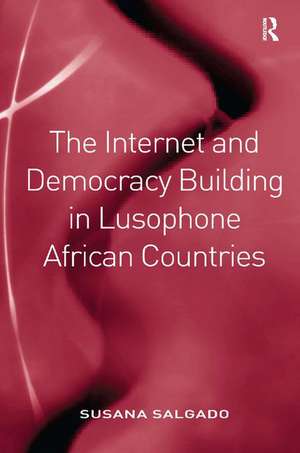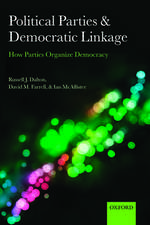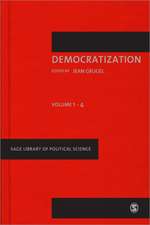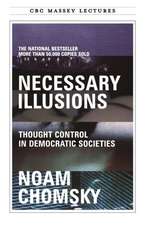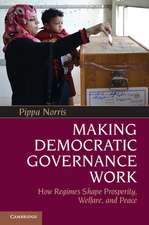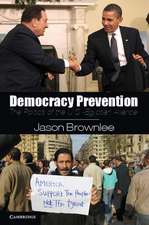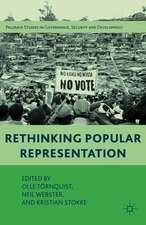The Internet and Democracy Building in Lusophone African Countries
Autor Susana Salgadoen Limba Engleză Hardback – 28 sep 2014
Preț: 526.16 lei
Preț vechi: 704.10 lei
-25% Nou
Puncte Express: 789
Preț estimativ în valută:
100.68€ • 105.38$ • 83.80£
100.68€ • 105.38$ • 83.80£
Carte tipărită la comandă
Livrare economică 31 martie-14 aprilie
Preluare comenzi: 021 569.72.76
Specificații
ISBN-13: 9781409436560
ISBN-10: 140943656X
Pagini: 198
Ilustrații: Includes 1 map
Dimensiuni: 156 x 234 x 18 mm
Greutate: 0.53 kg
Ediția:New ed
Editura: Taylor & Francis
Colecția Routledge
Locul publicării:Oxford, United Kingdom
ISBN-10: 140943656X
Pagini: 198
Ilustrații: Includes 1 map
Dimensiuni: 156 x 234 x 18 mm
Greutate: 0.53 kg
Ediția:New ed
Editura: Taylor & Francis
Colecția Routledge
Locul publicării:Oxford, United Kingdom
Notă biografică
Susana Salgado (Ph.D. 2007, University of Lisbon) is a researcher and professor of political communication and media and politics. Her main research interests are political communication, comparative media studies, media and democratization, media and elections, and politics and the Internet. Over the last few years her comparative research projects have been broad in geographical scope, and include different projects on Europe, Portugal and Brazil and an extensive analysis of the role of the media in African democratization processes in comparative perspective. Her publications include three single-authored books and several book chapters and journal articles in peer-reviewed publications on these topics. Susana is a member of the Network of European Political Communication Scholars (Nepocs), which is a network for furthering research and teaching in comparative political communication. She is also member of the management committee of COST Action IS1308: Populist Political Communication in Europe's New Media Environment: Comprehending the Challenge of Mediated Political Populism for Democratic Politics, as well as vice-chair of the working group: Populist Actors as Communicators.
Recenzii
’Challenging our ethnocentric view of what the internet can, should and will do for democracy, Salgado lifts the veil on innovative approaches to digital media life in Africa facilitating democratic change and the numerous challenges faced by users, sometimes at great personal risk. A fascinating insight into the development of modern communications in a somewhat neglected geographic area.’ Paul G. Nixon, The Hague University of Applied Sciences, The Netherlands ’There are two valuable reasons to read this interesting book. First of all it deals with a part of the world often neglected in the mainstream literature. Second, contrary to most of the existing research on the topic, it focuses on both legacy and new media and their combined role in the process of democratization. This combination represents the main novelty of the present media system worldwide.’ Paolo Mancini, University of Perugia, Italy
Cuprins
Introduction; Part I Media, Democracy and Development; Chapter 1 Development and Democracy; Chapter 2 Media, Information and Democratization; Chapter 3 The Role of the Internet: Hope, Potential and Reality; Part II Lusophone African Countries: Similar Past, Different Present, What Future?; Chapter 4 Similarities and Differences; Chapter 5 Politics and Media in Angola; Chapter 6 Politics and Media in Mozambique; Chapter 7 Politics and Media in Sao Tome and Principe; Chapter 8 Politics and Media in Cape Verde; Part III The Use of the Internet in the Lusophone African Countries and its Influence in Democratization; Chapter 9 Contextual Constraints for the Potential of the Internet in Lusophone African Countries; Chapter 10 Online News Media; Chapter 11 The Use of Blogs and Social Network Websites; Chapter 12 Political Parties’ Websites; conclusion Conclusion;
Descriere
This timely book fills an important gap in the literature on the influence of the Internet and new media in Portuguese speaking African countries. Based on extensive field work throughout the region, the author examines the influence of the Internet in the transition to democracy in Africa, and asks whether there are new possibilities for popular activism to emerge from evolving communication environments and media systems.
